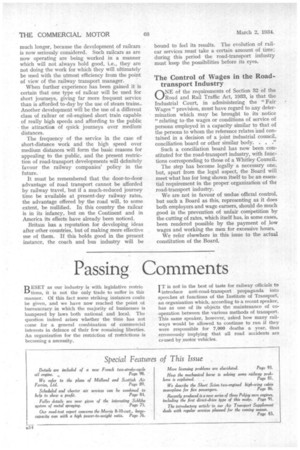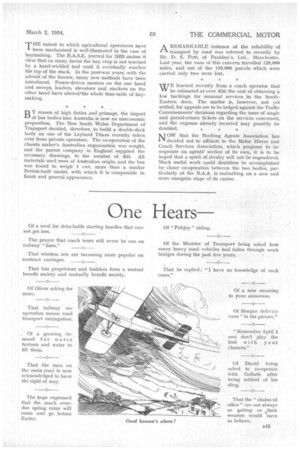Passing Comments
Page 28

Page 29

If you've noticed an error in this article please click here to report it so we can fix it.
BESET as our industry is with legislative restric lions, it is not the only trade to suffer in this manner. Of this fact some striking instances coula be given, and we have now reached the point of bureaucracy in which the majority of businesses is hampered by laws both national and local. The question indeed arises whether the time has not come for a general combination of commercial interests in defence of their few remaining liberties. An organization for the restriction of restrictions is becoming a necessity.
I T is not in the best of taste for railway officials to introduce anti-road-transport propaganda into speeches at functions of the Institute of Transport, an organization which, according to a recent speaker, has as one of its objects the maintenance of cooperation between the various methods of transport. This same speaker, however, asked how many railways would be allowed to continue to run if they were responsible for 7,000 deaths a year, thus erroneously implying that all road accidents are caused by motor vehicles.
HE extent to which agricultural operations nave A been mechanized is well-illustrated in the case of haymaking. The R.A.S.E. journal for 1933 makes it clear that on many farms the hay crop is not touched by a hand-wielded tool until it eventually reaches the top of the stack. In the post-war years, with the advent of the tractor, many new methods have been introduced. Power-driven mowers on the one hand and sweeps, loaders, elevators and stackers on the other hand have altere&the whole time-table of haymaking.
Y reason of high duties and primage, the import of bus bodies into Australia is now an uneconomic proposition. The New South Wales Department of Transport decided, therefore, to build a double-deck body on one of the Leyland Titans recently taken over from private operators. The co-operation of the chassis maker's Australian organization was sought, and the parent company in England supplied the necessary drawings, to the number of 400. All materials used were of Australian origin, and the bus was found to weigh 1 cwt. more than a similar British-built model, with which it is comparable in finish and general appearance.
AREMARKABLE instance of the reliability of transport by road was referred to recently by Mr. D. S. Pott, of Paulden's, Ltd., Manchester. Last year, the vans of this concern travelled 128,000 miles, and out of the 150,000 parcels which were carried only two were lost.
WE learned recently from a coach operator that he estimated at over £50 the cost of obtaining a few backings for seasonal services in the South Eastern Area. The matter is, however, not yet settled, for appeals are to be lodged against the Traffic Commissioners' decisions regarding the issue of single and period-return tickets on the services concerned, and the expense already incurred may possibly be doubled.
NT OW that the Booking Agents Association has
decided not to affiliate to the Motor Hirers and Coach Services Association, which proposes to inaugurate an agents' section of its own, it is to be hoped that a spirit of rivalry will not be engendered. Much useful work c,ould doubtless be accomplished by closer co-operation between the two bodies, particularly aA the B.A.A. is embarking on a new and more energetic stage of its career.




























































































